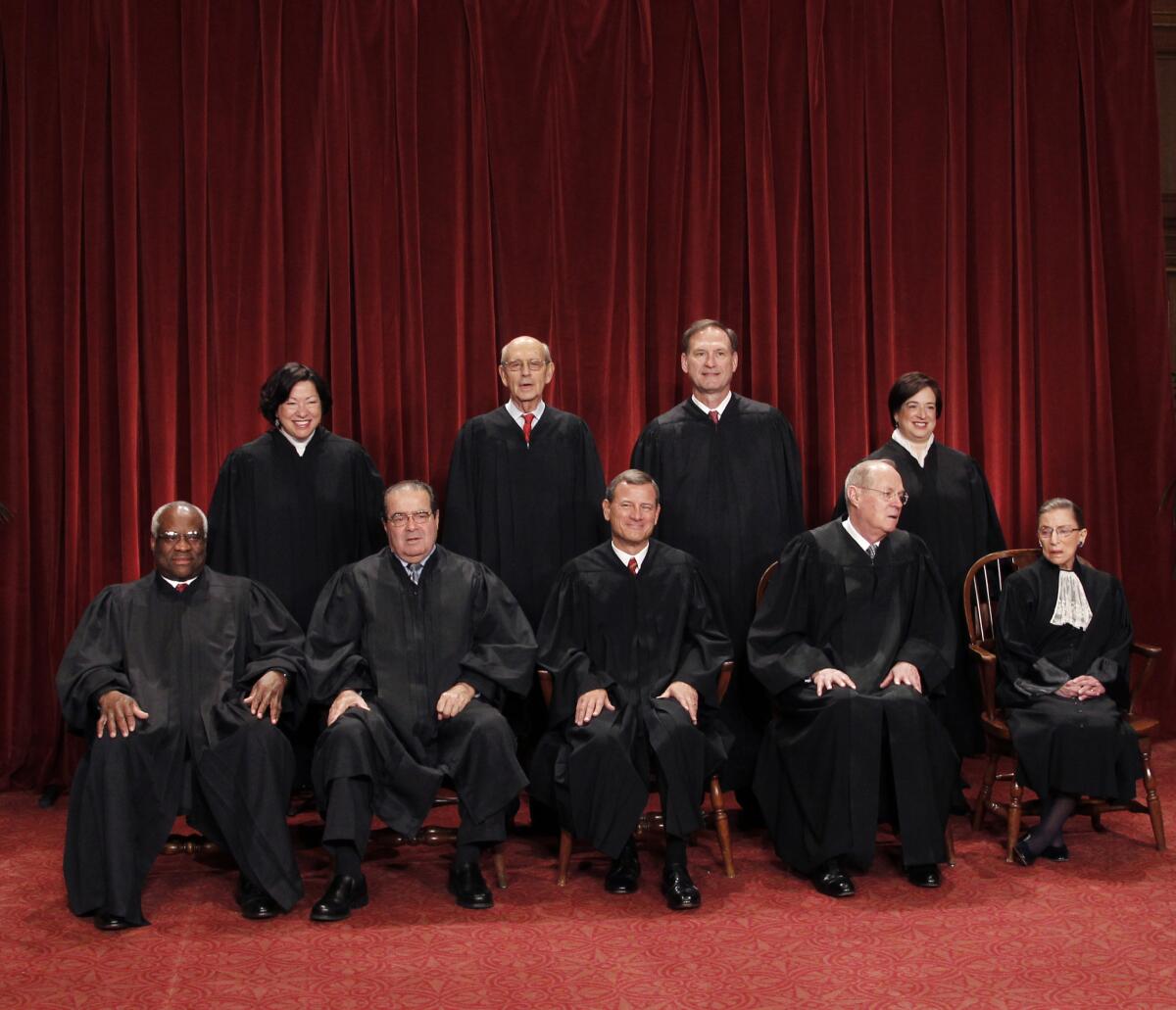Op-Ed: Let’s lift the Supreme Court’s veil of secrecy

- Share via
Every year the justices of the U.S. Supreme Court are faced with about 7,500 writs of certiorari seeking appellate review of lower court decisions, granting only 75 to 80. It takes four justices to grant a writ, though amazingly that rule is nowhere written down and the justices could change it at any time.
When the Supreme Court votes on whether to grant a writ of certiorari, it doesn’t reveal which justices voted in favor of or against hearing the case (unless a justice writes a dissent, which is highly unusual). This secrecy is totally unnecessary and inconsistent with democratic aspirations of public transparency and open government.
The importance of the all-too-mysterious certiorari process was highlighted Monday when the court refused to hear any of the seven appeals on the decisions striking down bans on same-sex marriage. The court’s decision not to hear any of these cases means that same-sex marriage now has to be recognized in an additional 11 states. The justices’ refusal to hear the cases has important real-world consequences, yet we have no idea how each justice voted.
The normal presumption of democratic governments is that public decisions will be made openlyso that the people can hold their leaders accountable. The votes of individual members of Congress onlegislation are a matter of public record, as are the president’s decisions to veto or sign bills. Imagine trying to evaluate the work of legislators or the president if such decisions were made privately and anonymously. No one would argue that it is enough to know that a bill failed to garner enough votes to pass. We would demand to know how each member voted.
The Supreme Court does not keep any official record of the justices’ votes on writs of certiorari. The public cannot meaningfully evaluate the work of individual justices without this information. What if it turned out that Justice X consistently voted against hearing civil rights cases or environmental law cases, or Justice Y consistently voted in favor of hearing campaign finance reform, affirmative action or abortion cases? Which cases a justice thinks are important enough for the court to hear define, in significant part, the work and career of that justice.
I am not suggesting that the court provide reasons why it doesn’t hear a case. Many of the petitions are obviously not important enough to justify the court’s attention, and requiring the justices to have to agree on reasons for more than 7,000 denials annually would not be worth the effort. But there is no reason the votes of the justices could not be provided, especially because it is likely that most denials are unanimous, and the vote could be recorded as such. When the vote is not unanimous, the names of the dissenting justices could be released, and it would be up to them if they wanted to explain that dissenting vote in more detail.
Most important, when the court grants a writ, the names of the justices who wanted to hear the case should be made public. This data could provide the parties and the public with significant information about that particular case, and would allow Americans to see how the individual justices voted over time on important issues. After all, the justices are public officials whose votes on matters of concern should not be kept secret unless there are compelling reasons to do so.
Supreme Court justices are among our most secretive governmental officials. They never appear on television when they are hearing cases or announcing decisions, they never participate in news conferences about their work, and their all-important votes on which cases to hear and which cases not to hear are not a matter of public record. There is no reason the justices should be so invisible to the American people.
Under Article III of the Constitution, Congress has significant (almost plenary) power over the jurisdiction of the Supreme Court. If the justices don’t do so voluntarily, Congress should use this power to require the justices to make their individual votes on certiorari petitions public.
Eric J. Segall, a law professor at Georgia State University, is the author of “Supreme Myths: Why the Supreme Court Is Not a Court and Its Justices Are Not Judges.”
Follow the Opinion section on Twitter @latimesopinion
More to Read
A cure for the common opinion
Get thought-provoking perspectives with our weekly newsletter.
You may occasionally receive promotional content from the Los Angeles Times.









